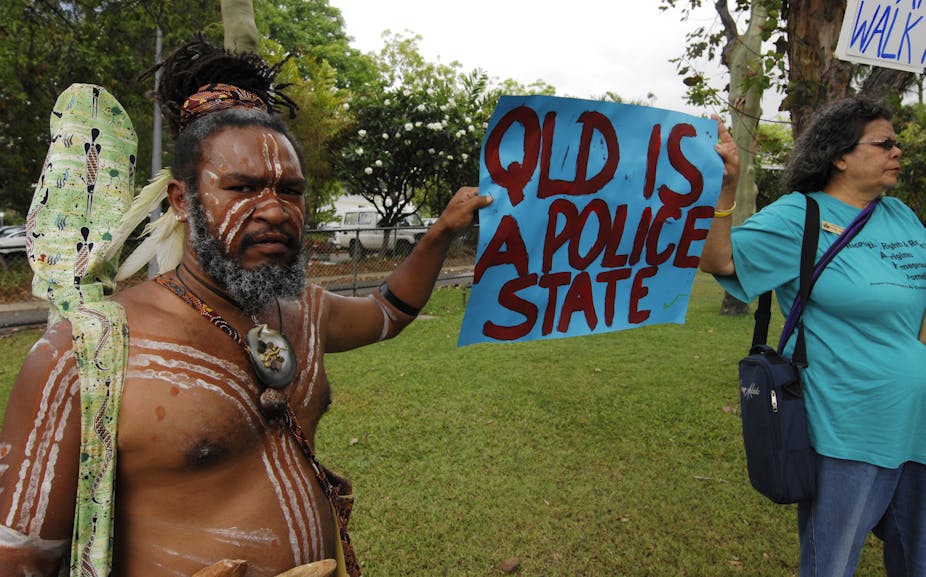When a prisoner has served their time, it’s difficult to understand why they would be stopped from engaging in public debate or communicating with the media. But a new precedent has been set by the High Court with serious implications for freedom of speech.
The court found against a Palm Island man, Lex Patrick Wotton, who was charged with inciting in a riot on Palm Island following the death in police custody of Mulrunji Doomadgee. He was convicted, and on his release his parole conditions stated he was not allowed to speak to the media and needed to gain permission before he could attend public meetings on Palm Island. Wotton challenged the constitutional validity of the laws underpinning these conditions in the High Court.
This case highlights how limited Australia’s constitutional protection of free speech is, and how restricted our legal rights really are.
Limited protection
Unlike most democratic nations, Australia does not have a charter or bill of rights that guarantees free speech. Instead, the High Court has found a freedom of communication to be implied from the Constitution.
The issue for the court in Wotton then, was whether certain sections of the Queensland Corrective Services Act were invalid in their application to prisoners on parole.
Wotton was convicted of rioting causing destruction and sentenced to six years’ imprisonment with a parole eligibility date after two years served. When the board directed Wotton be released on parole, they placed 22 conditions on his release.
These conditions, based on the Queensland Corrective Services Act, prohibited Wotton from attending public meetings on Palm Island without the prior approval of the corrective services officer, as well as from receiving any direct or indirect payment or benefit from the media. It also required that Wotton “not commit an offence”.
Crucially, the Corrective Services Act also makes it an offence for a person to “interview a prisoner, or obtain a written or recorded statement from a prisoner” including a prisoner released on parole, under section 132(1)(a).
Wotton brought proceedings to the High Court challenging the constitutional validity of sections 132(1)(a) and 200(2) of the act, as they apply to prisoners on parole. This second section allows the parole board to place parole conditions ensuring a prisoner’s good conduct and to prevent him re-committing an offence.
This was on the basis that they impermissibly burden the constitutional freedom of communication about government and political matters.
The court’s findings
The High Court unanimously held that ss 132(1)(a) and 200(2) of the act were constitutional. In reaching this conclusion, the court applied the two questions set out in the decision in Lange v Australian Broadcasting Corporation.
First, does the law burden freedom of communication about government or political matters? Second, does the law effectively burden that freedom? That is, is the law reasonably appropriate and adapted to serve a legitimate end (in a matter compatible with the maintenance of the constitutionally prescribed system of government)?
The court answered the first question favourably for Wotton, accepting that the law burdened communication about government and political matters. This was because the public debate of Aboriginal and Indigenous affairs, including perceived or alleged injustices, involves communication about government and political matters at a national level.
This is plainly right, although it does give rise to the issue observed by Justice Heydon in his concurring opinion:
The consideration of each question is “capable of being applied by each particular judge in a different way.” This “tends to lead to sharp divisions of judicial opinion, with cases being decided by the reasoning of a bare majority or by majority agreement on the orders but not the reasoning that leads to them.”
His Honour is correct when he concludes that “none of this tends to certainty.” Nonetheless, the two questions from Lange are now firmly entrenched in the jurisprudence of the implied constitutional freedom of communication about government and political matters, and are unlikely to change.
The court then turned to the second question from Lange, whether the law nevertheless is reasonably appropriate and adapted to serve a legitimate end. It held that the sections were indeed reasonably appropriate and adapted to serve a legitimate end in a manner compatible with the maintenance of the constitutionally prescribed system of government. These ends were community safety and crime prevention through humane containment, supervision and rehabilitation of offenders
That the High Court would unanimously find these provisions constitutional, effectively preventing parolees such as Wotton to speak to the media or the freedom to engage with political issues, should be a matter of concern to those of us who value free speech.
This decision highlights just how weak our constitutional protections for freedom of political expression and association are in this country, and why things need to change to better protect our rights.

